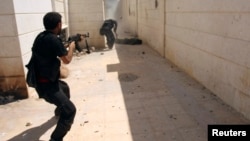U.S. efforts to provide weapons to moderate rebels in Syria are suffering setbacks as al-Qaida-linked militants force the collapse of mainstream insurgent groups fighting the Syrian military. Analysts say the developments underscore the risks of a new Pentagon program to train and equip moderate rebels.
Recent gains in Syria by the al-Qaida affiliated Nusra Front represent a blow to U.S. strategy of identifying and arming groups to oppose the Syrian military, analysts say.
An onslaught by Nusra fighters forced the Hazzm movement to collapse in recent days as the moderate rebels fled their headquarters in Aleppo Province.
Hazzm was once central to a covert CIA operation to arm Syrian moderates. It is the second time in recent months that Nusra crushed a Western-backed rebel group.
Jennifer Cafarella, a Syrian expert at the Institute for the Study of War, said Nusra is working to become the predominant group battling the military of Syria's President Bashar al-Assad.
“I would characterize the situation in Syria as one in which al-Qaida continues to enjoy a disconcerting level of safe-haven and is growing in momentum in its efforts to become the sort of spearhead of the Syrian revolution,” Cafarella said.
Nusra supporters published photographs on social media of what they said were captured U.S. weapons, including anti-tank missiles.
The Obama administration has been slow to arm Syrian rebels, fearing the weapons could end up in the hands of extremists.
Challenges
Jonathan Schanzer, vice president for Research at the Foundation for Defense of Democracies, said Nusra’s recent actions “underscore the challenges that we have long been aware of and really that have made the administration somewhat gun-shy about supporting these groups in the first place.”
“None of the groups that are deemed moderate have the strength or the military ability to really hold territory or should be trusted with the kind of advanced weaponry that we need to provide in order to take down the Assad regime,” Schanzer said.
Analysts say Hazzm’s defeat is a setback for Washington, which with its allies has tried to strengthen moderate forces.
The Pentagon is screening about 1,200 Syrian rebels who could participate in a new training program and eventually fight against Islamic State extremists.
Facilities are being set up in Turkey, Saudi Arabia and Qatar, with the goal to train about 5,000 fighters over the next year.
Risks
“I think that what has happened to Hazzm and before it the Syrian Revolutionary Front is in fact correctly regarded as a dangerous indicator of the potential risk of sending meaningful support to rebels,” Cafarella said.
“However, I would highlight that the risk of not doing so and the risk of not actually providing meaningful and sustained support to the Syrian revolution in the long term is actually going to enable and embolden al-Qaida in Syria,” he said.
Hazzm’s defeat shows that efforts to support Syrian rebels face challenges in a civil war where fighters battle each other and often form a complex web of alliances, analysts say. The Nusra Front wants to defeat moderate groups because of their dependence on Western allies, analysts say.
“As the U.S. train-and-assist mission gets off the ground and begins to actually engage on the ground in Syria we are likely to see further J-N [Jabhat al Nusra] escalation against both Western interests inside of Syria and possible engagement with wider al-Qaida attempts to attack the West,” analyst Cafarella said.
Syria is not the first battlefield where the United States has lost military investments intended for an ally in the Middle East.
In Yemen, Houthis seized the capital and government officials fled after receiving hundreds of millions of dollars in aid. In Iraq, the Pentagon spent billions to support Iraqi security forces, many of whom left their posts when faced with fighters from the Islamic State group.
Analyst Schanzer says Washington has struggled with success in its military options in the Mideast.
“Really any bet that you make in the Middle East, which is often characterized by weak central governments, corrupt governments, governments that are unpopular with the people on the ground or potentially in danger of being overrun by violent Islamist movements,” Schanzer said. “These are bets that very often bode poorly and the United States has paid the price on multiple occasions.”




